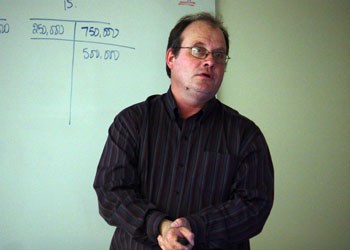The Conversations with US program connects experts from the University of Saskatchewan with the Parkland College to discuss issues relevant to the region. Jeff Schoneau, professor and Ministry of Agriculture Strategic Research Chair for the University of Saskatchewan spoke about soil in the province.
Schoneau says that the soil in the province is in much better shape now than it had been thirty years ago, and he cites two reasons for why that is the case. He says that a move to a three-crop rotation and zero-till seeding practices have been two of the most important changes in the way the province farms.
The three-crop rotation uses a cereal, a legume and an oil seed in rotation. Schoneau says that this is necessary to renew the nutrients in the soil, as keeping it on one crop tends to leech out the necessary nutrients.
"The magic of legumes is that they can fix nitrogen from the air and add it to the soil, and become a replacement for nitrogen soil. The advantage is not only the legume crop," Schoneau says.
He admits that this can sometimes be tempting to ignore, as one crop gains value and it is tempting to replant that crop repeatedly. He admits that there are problems with disease that are cropping up as new crops are becoming more common, and especially as people begin growing cash crops like Canola more frequently than might be a good agronomic practice.
"In the short term, when you're thinking of returns you're thinking of the price of that crop, and the tendency is to want to grow it more frequently. That may be short term gain and long term pain."
When it comes to no-till, he says that tillage tends to cause an increased breakdown of organic material and the field loses the nutrients inherent in that organic matter. It also makes the field more prone to erosion. Schoneau says that when comparison is done, no-till increases the organic matter, but it works best when combined with multi-crop rotation. He also notes it's also significantly more efficient, though he admits this could be the reason for much bigger farms.
When it comes to challenges, he notes that herbicides have become significantly more important, and with over-use of one kind of herbicide also comes weeds that are resistant to that herbicide.
Another important change is the recognition of manure as a resource, Schoneau notes, something else which had a significant positive impact on the province's soil. He notes that it has organic matter, which is essential to the health of soil, and that it's an effective way to use what used to be waste product.
Overall, the soil is improving in the province, but Schoneau admits that there is always a risk of farmers moving away from the practices that are helping that happen.




